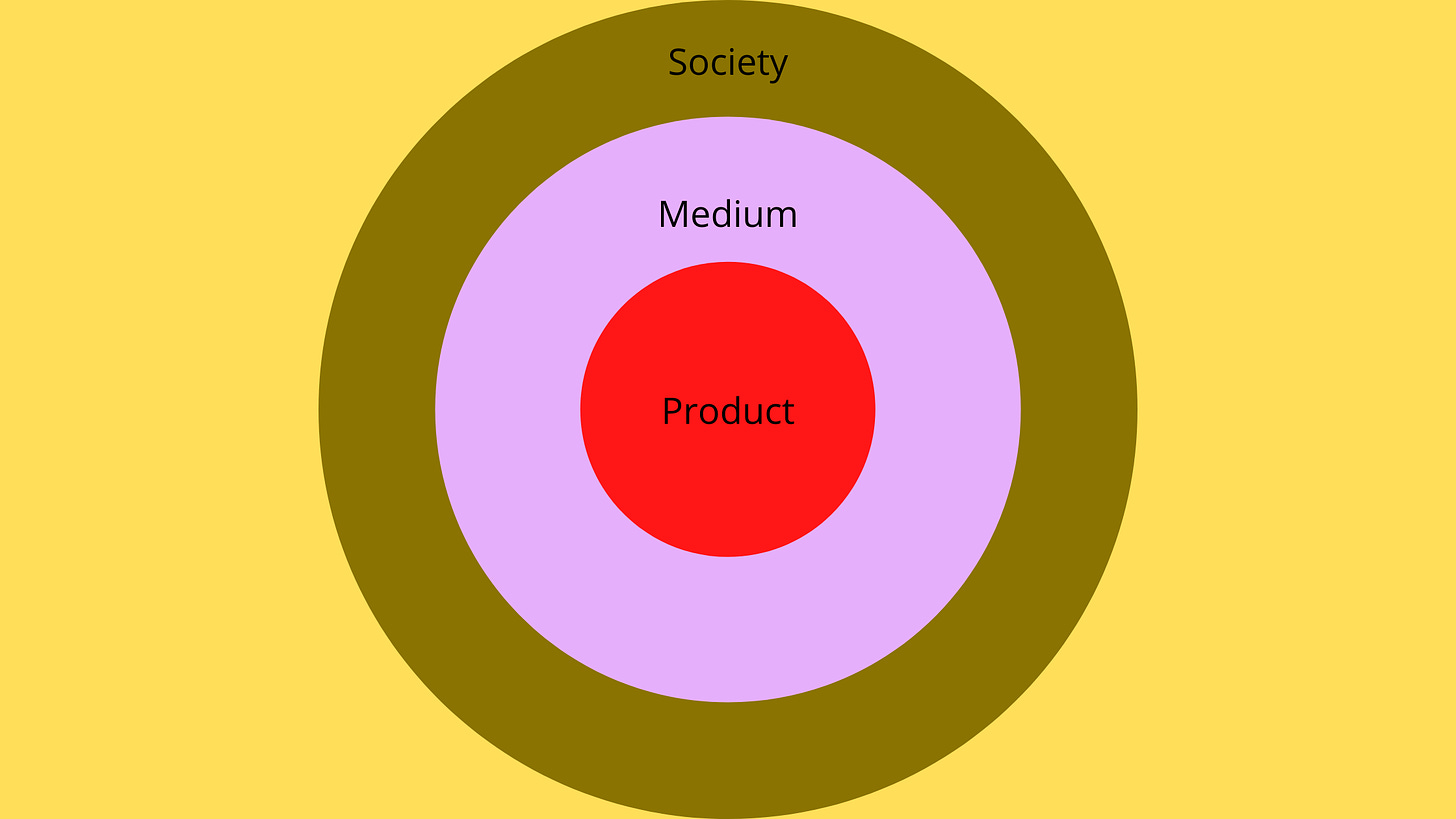I am taking a step back to assess where I am and where I want to go.
The Birth of a New Medium
The internet was a technology for twenty years before it became a medium in the 90s. With the metaverse and Web3 and AI and autonomous vehicles (as well as fake news and trolls) we can glimpse a world saturated by the internet, i.e., where the interverse plays an even more expansive role than what writing plays today: the universal medium of all ideas, ideals, institutions etc etc. Having said that, it’s still early days.
How does one narrate this emerging medium?
At one end of the spectrum lie the technologies behind the medium: web technologies (including that of the 3D web), identity and financial technologies and finally data and AI technologies. That’s the focus of most people writing about this medium and where the money lies for now. If I were to describe this cluster in one word, it would be: backbone to denote the technological foundation on which everything else will be built.
At another end of the spectrum lies the political economy and changing social relations of this medium; of how it’s being driven by and driven for the richest, most powerful people and institutions, including corporate and state actors. If I were to describe this cluster in one word, it would be: history, to denote the actual evolution of society backboned by these emerging technologies.
In the middle is what I call the medium consisting of human needs, design challenges and social opportunities that are constrained both by the affordances of the technologies and the pressures of economics and politics. If I were to describe this cluster in one word, it would be: possibilities, to denote the spaces for exploration and exploitation that are opening up.
The medium is my message, though what I say about its possibilities will be informed by technology as well as society.
For example, consider money. It’s currently a medium of value, useful for accounting, for exchange and for storage. I can use money to buy things (medium of exchange), to keep tabs of what I have bought (medium of accounting) and invest the remainder in the mutual funds (a storage medium). While our identities are deeply intertwined with money (rich and poor are identity markers as well as descriptions of fact), we don’t measure identity directly with money.
That might change as identity - cryptographic or otherwise - becomes central to the financial system. In looking at money as a medium, I will want to explore how money is being reshaped to incorporate identity into it and perhaps even make it about identity at its core. You can see the beginnings of that shift in new developments such as this lending app which shames you into paying your debt, i.e., an app that monetizes your ‘character’ directly rather than indirectly. Not surprising: village life was always public: everyone knows who you are and what you’re doing but urban life was anonymous until recently.
Data flows and surveillance mechanisms - state, corporate AND community surveillance - are making city life much more village like, and so why not create a marker of identity value (along with use value and exchange value) that captures what your character is worth? The world leader in this shift towards ‘money is identity’ has to be China and its social credit system, where an increasing range of behaviors are measured and added to a credit score.
If identity is media and cities are media, can we take a bold step forward and say: ‘everything is media1,‘ with the all pervasive internet as a real life universal medium that cashes out the metaphysical claim? And as media swallows everything from money to cars and cities, our claim becomes ever more powerful.
It’s not software that’s eating the world, it’s media.
The specific version of ‘everything is media’ is ‘reality is media’ and in saying so, I mean:
the possibilities opened up by considering reality itself as a medium and
asking what technologies support those possibilities and
how these realities will be shaped by economics and politics.
The code disciplines - Cybernetics, Computer Science, Cognitive Science, AI, Molecular Biology - came into being at the beginning of the Cold War and an infusion of fresh blood when the cold war ended - leading to quantum computing, consciousness studies and the AI/ML second wave. Our understanding of mind and life were revolutionized in this period and our lives are deeply influenced by the products of that revolution.
The pandemic is a marker of a new phase of history (though not its cause) and I believe the study of reality as such will be inaugurated now2 and its consequences will saturate our lives in the future. It’s both amazing and terrifying that we are standing at the edge of the abyss, not knowing where we will land when we jump.
Foundational concepts make it possible to say ‘everything is X’ and have a plausible account as to why. So it’s possible to say: ‘everything is a machine,’ ‘everything is logic,’ ‘everything is mind,’ ‘everything is language’ and so on. The plausibility of an ‘everything is X’ account depends on showing how large parts of human reality can be turned into X or seen as X.
It’s not that reality has never been studied ‘as such’ before - of course it has in several philosophical and contemplative traditions - but that we are at a cusp of a major transition in its study.




